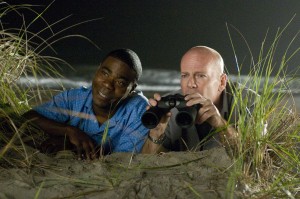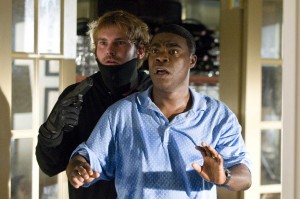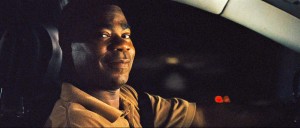He Never Meta Film Reference He Didn’t Like: A Review of Cop Out
 The late, great film critic Pauline Kael wrote that “an homage is a plagiarism that your lawyer tells you is not actionable.” Where do you draw that line though? When does gentle chiding and affection turn into parody? Certainly a film like last year’s Black Dynamite made that difficult to determine; because, while it tried hard to replicate blaxploitation to the point where it would be indistinguishable from an actual film from 1973, it also made self-aware references to the fact that what it was doing was inherently ridiculous.
The late, great film critic Pauline Kael wrote that “an homage is a plagiarism that your lawyer tells you is not actionable.” Where do you draw that line though? When does gentle chiding and affection turn into parody? Certainly a film like last year’s Black Dynamite made that difficult to determine; because, while it tried hard to replicate blaxploitation to the point where it would be indistinguishable from an actual film from 1973, it also made self-aware references to the fact that what it was doing was inherently ridiculous.
Kevin Smith’s Cop Out is much too lazy to even approach parody or satire. It’s basically a straight-ahead, modern version of Beverly Hills Cop, 48 Hours, Lethal Weapon 2, or any other “racially diverse” cop-buddy movie from the 1980s that featured a mouthy cop and his begrudgingly accommodating partner. That the clichés of cop movies, the angry captain who orders the reckless team to give him their badges and guns, the desperate need for the cop with strong family ties to attend his “perfect” daughter’s wedding/recital, the wacky car chases, etc, were mercilessly parodied to death by 1993 (Last Action Hero, Loaded Weapon 1) may have given Smith the idea that enough time had passed where old and tired could become new and fresh again.
 The thing is, Smith could potentially be right. But Cop Out is so half-baked and thrown together in the editing room that it can’t even meet the meager expectations given to us by its dire trailer. Smith tries to excuse all of the laziness up front by having the first scene explain an homage and have “out of control” cop Tracy Morgan make references to various popular films of the last 30 years during the interrogation of a suspect. Not a promising start — relying on other films to do the work for you. But what makes it worse than even Smith’s own 2 hour fitfully funny in-joke Jay and Silent Bob Strike Back, is that Smith apparently didn’t trust the audience to get the references. And so he actually has Bruce Willis, playing Tracy Morgan’s perpetually eye-rolling partner, tell us where each bit of cribbed dialogue comes from (except for the obnoxious From Paris With Love –like Die Hard reference).
The thing is, Smith could potentially be right. But Cop Out is so half-baked and thrown together in the editing room that it can’t even meet the meager expectations given to us by its dire trailer. Smith tries to excuse all of the laziness up front by having the first scene explain an homage and have “out of control” cop Tracy Morgan make references to various popular films of the last 30 years during the interrogation of a suspect. Not a promising start — relying on other films to do the work for you. But what makes it worse than even Smith’s own 2 hour fitfully funny in-joke Jay and Silent Bob Strike Back, is that Smith apparently didn’t trust the audience to get the references. And so he actually has Bruce Willis, playing Tracy Morgan’s perpetually eye-rolling partner, tell us where each bit of cribbed dialogue comes from (except for the obnoxious From Paris With Love –like Die Hard reference).
The rest of Cop Out, like its generic title, plays like one of Steven Seagal’s recent DTV offerings; where the plot doesn’t make a lot of sense and exposition is handled in voiceover, suggesting that the movie was never really finished — just that the accountants told them to stop shooting. This theory is backed up by how much improvising was clearly required of the actors. That’s fine in small spurts for Tracy Morgan (which is why he is funny on 30 Rock), but disastrous for Bruce Willis, as evidenced by his work in The Whole Ten Yards and Hudson Hawk, or whenever you see Willis promoting his films on a talk show. This was especially obvious when he was trying to rally behind The Whole Ten Yards during a Letterman appearance and you could see how hard he was trying to be funny and goofy, instead of relaxing and letting the humor arrive naturally.
 Throughout Cop Out you can see Morgan, Willis, and Seann William Scott (as a petty thief) trying to be funny through outbursts of childish behavior. There’s no consistency of tone and there’s no inkling that the actors understood that the best way to play comedy is to play it straight.
Throughout Cop Out you can see Morgan, Willis, and Seann William Scott (as a petty thief) trying to be funny through outbursts of childish behavior. There’s no consistency of tone and there’s no inkling that the actors understood that the best way to play comedy is to play it straight.
It is possible to justify Cop Out as a “loving retread.” But that’s really just an excuse. Yes, we notice the use of the Harold Faltermeyer score (Beverly Hills Cop, Fletch, Top Gun), courtesy of his Casio. But that’s just a reminder that Smith has been trying to get his own Fletch film made with Jason Lee for years, and it looks like he settled for Cop Out instead.
 Is Cop Out deliberately bad, with its phony looking dummies flying out of car windshields, visually ungainly photography, strangely graphic violence at odds with the tone of the rest of the film, sloppy editing, and glacial pacing? If a movie is this dull and unprofessional — to the point where you’re either cringing or have the constant urge to leave — does it really matter?
Is Cop Out deliberately bad, with its phony looking dummies flying out of car windshields, visually ungainly photography, strangely graphic violence at odds with the tone of the rest of the film, sloppy editing, and glacial pacing? If a movie is this dull and unprofessional — to the point where you’re either cringing or have the constant urge to leave — does it really matter?



